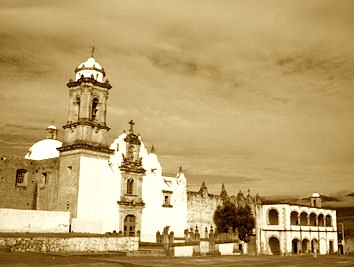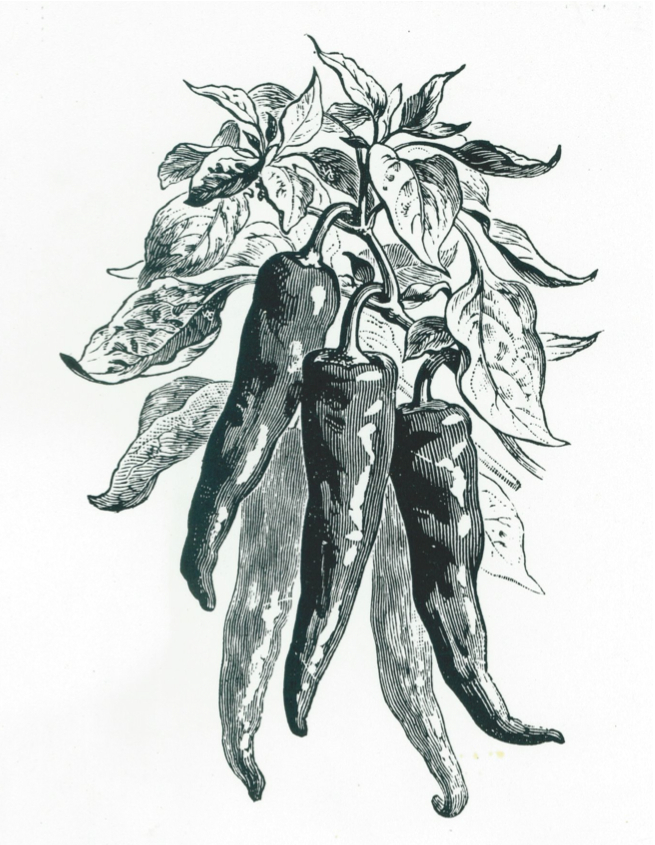 The owner of this famous hacienda is a Creole, named Don Juan de Moncada. From the hacienda he takes the title of Marques. Previous to the revolution, he was considered among the richest of the landed proprietaries of Mexico, and in the year 1810 actually possessed in his own mansion six millions of dollars. The rent he derived from his estates; the revenues he drew from cattle, and horses, which latter are the finest in the kingdom, and from his own culture of wheat, corn, and the article of chile (capsicum), were immense. Some idea may be formed of his income, when we state that he received from the cultivation of chile alone, upwards of twenty-five thousand dollars annually. The great quantities of this pungent vegetable, which is grown in almost every part of Mexico, strikes a stranger with astonishment. In the districts where the soil is best adapted to its culture, we behold enormous collections of it in all the magazines. For all culinary purposes, this vegetable is as essential to the Mexican, as salt is to the European, and indeed more so, because a Mexican would rather go without bread, than lack chile with his meat. At the table of the rich and poor, it constitutes an article of luxury as well as necessity. Both in its green and dried state, the quantity consumed is incredible. When mashed, and mixed with a little water, it is the universal sauce or seasoning on the tables of the great; whilst with the poor, it forms a component part of their diet. More than one third of the Mexican population, live throughout the year on tortillas and chile; which last is spread on their tortillas, as butter is with us, though much thicker. On days of festivity, these poor people have an occasional change of diet, by the addition of a few eggs, or a little broth (caldo), but they never relinquish the use of their favorite chile. A stranger, in passing through the country, has great difficulty for the first few months to bear with the food prepared with chile, but after his palate becomes accustomed to its stimulus, it ceases to excoriate, and he generally gets as fond of it as the Indians and Creoles.
The owner of this famous hacienda is a Creole, named Don Juan de Moncada. From the hacienda he takes the title of Marques. Previous to the revolution, he was considered among the richest of the landed proprietaries of Mexico, and in the year 1810 actually possessed in his own mansion six millions of dollars. The rent he derived from his estates; the revenues he drew from cattle, and horses, which latter are the finest in the kingdom, and from his own culture of wheat, corn, and the article of chile (capsicum), were immense. Some idea may be formed of his income, when we state that he received from the cultivation of chile alone, upwards of twenty-five thousand dollars annually. The great quantities of this pungent vegetable, which is grown in almost every part of Mexico, strikes a stranger with astonishment. In the districts where the soil is best adapted to its culture, we behold enormous collections of it in all the magazines. For all culinary purposes, this vegetable is as essential to the Mexican, as salt is to the European, and indeed more so, because a Mexican would rather go without bread, than lack chile with his meat. At the table of the rich and poor, it constitutes an article of luxury as well as necessity. Both in its green and dried state, the quantity consumed is incredible. When mashed, and mixed with a little water, it is the universal sauce or seasoning on the tables of the great; whilst with the poor, it forms a component part of their diet. More than one third of the Mexican population, live throughout the year on tortillas and chile; which last is spread on their tortillas, as butter is with us, though much thicker. On days of festivity, these poor people have an occasional change of diet, by the addition of a few eggs, or a little broth (caldo), but they never relinquish the use of their favorite chile. A stranger, in passing through the country, has great difficulty for the first few months to bear with the food prepared with chile, but after his palate becomes accustomed to its stimulus, it ceases to excoriate, and he generally gets as fond of it as the Indians and Creoles.
From William Davis Robinson, Memoirs of the Mexican Revolution. Philadelphia: Lydia R. Bailey, printer, 1820.








